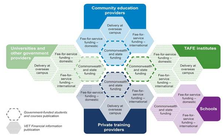 AFL SportsReady has created a new video promoting the benefits of VET to school students who want a career in sport. The organisation is a not-for-profit company dedicated to helping young Australians develop careers through traineeships and educational opportunities. The video features a number of people who are working in the industry and undertook a VET qualification to secure their dream job. This includes the CEO of the St Kilda Football Club, Matt Finnis, who decided to leave his arts degree at university and pursue his passion through an AFL SportsReady traineeship. Other similar cases are highlighted in the video. See the full video here.  A total of 23 grassroots sporting projects from across Western Australia will share in more than $634,000 in the latest round of the Government's Community Sporting and Recreation Facilities Fund (CSRFF). Successful projects will provide communities from Kununurra, to Beeliar and Albany with access to improved playing fields, better courts, new women's facilities and change room improvements. The funding round also includes projects on disability access, BMX track improvements, cricket nets, bowling greens and other facilities. The State Government offers CSRFF grants to ensure community level sports clubs across metropolitan and regional areas have access to quality infrastructure and facilities. The CSRFF has two rounds of small grants each year that open in February and July. It also has two larger grant rounds. For more information, visit http://www.dsr.wa.gov.au/funding/facilities-(csrff)  More than 180 of Western Australia's aspiring regional athletes will be helped to attend training camps and competitions, thanks to a State Government program that assists with travel costs. The Athlete Travel Subsidy Scheme assists regional families with young athletes aspiring to compete at the highest levels by offsetting out-of-pocket travel and accommodation costs. Young competitors in a range of sports, including surfing, polocrosse, cricket, netball and basketball are among the 184 athletes sharing in more than $97,400 of grant assistance. The Athlete Travel Subsidy Scheme is funded by the State Government and has supported thousands of regional families with more than $1 million in grants since its inception. For details of regional grants and programs available in your area, visit http://www.dsr.wa.gov.au/about/regions  The Minister for Innovation and ICT has welcomed the appointment of Greg Italiano as the new Government Chief Information Officer. Mr Italiano has worked in a number of senior roles within the Western Australian public sector. He was appointed following a formal process, and will commence in the role on December 17, 2018. Mr Italiano's previous role was Executive Director Corporate Services within the Department of Justice, where he was overseeing its digital transformation. Mr Italiano will lead the Office of Digital Government within the Department of the Premier and Cabinet and be responsible for the State's digital reform agenda to deliver better services to the community.  The state Government is seeking qualified experts to join a new panel that will provide independent advice to improve the design of buildings and infrastructure projects. Suitably qualified built environment design experts can now apply to join the newly established Western Australian State Design Review Panel. The panel will help improve the design quality of major State, local, and private sector buildings and infrastructure projects. It will bring together a pool of about 40 professionals from a range of built environment disciplines including architecture, urban design, urban planning and landscape architecture. Chaired by the Government Architect, Geoff Warn, the panel will also be seeking specialists in sustainability, heritage, accessibility, public health and master planning. The initiative is part of the State Government's Design WA initiative that aims to put good design at the heart of all development and which includes a design review guide, updated residential design codes and a State planning policy to guide the development of the built environment. Expressions of interest close on December 21, 2018. For more information, visit http://www.planning.wa.gov.au/sdrp.aspx  The School Curriculum and Standards Authority is establishing a range of new advisory committees in 2019. The Late Adolescence and Early Adulthood (Years 11 and 12) Committee are looking to include person(s) with expertise in training, industry or community affairs. An application process will be conducted by the Authority to select practicing teacher representatives from all school systems/sectors; representatives from the education systems/sector offices and professional associations; and, as appropriate, representatives from universities, training sector, industry and community to be the inaugural members of the newly formed Curriculum Advisory Committees. A Chair for each committee will be selected by the Authority prior to the first meeting. Read more and apply here 
Cyber crime is a threat to every organisation that operates internet-connected devices. It’s highly profitable, highly disruptive, and hard to police due to the transnational nature of cyberspace. Incidences of cyber crime might include fraud, identity theft or privacy breaches, which can have a high personal impact. Ransomware, which locks a system and demands payment, can have widespread economic or healthcare implications. In the past year, 25% of the Australian adult population was impacted by cyber crime. If we want a robust and resilient society, we need cybersecurity professionals defending every organisation from cyber attack. Cybersecurity professionals might work in software development, network testing, incident response, or policy development to ensure the security of an organisation. In popular culture, these experts are often portrayed as lone hackers in hoodies. But in reality, cybersecurity professionals must regularly communicate with a variety of audiences. They must also display a high degree of personal integrity. Read more: What teenagers need to know about cybersecurity What cybersecurity professionals doTo ensure our cybersecurity classes are teaching skills relevant to industry, we consult with security professionals about the skills they are looking for. As well as technical skills, they tell us they want those they hire to have communication skills, work well in teams, and show empathy and integrity. The following scenarios show what cybersecurity professionals do on a daily basis. (Names and details have been changed.) Ensuring systems are compliantAnna is a software developer for an online retailer. She notices that one of their systems is processing credit card transactions in a way that does not comply with the Payment Card Industry Standards. The technical project leader does not understand the legal jargon of the PCI standard. The business and legal staff do not understand the software processes behind credit card transactions. It’s Anna’s job to bring together technical, legal, and business operations staff to discuss the resources required to fix this problem. Identifying vulnerabilitiesBasim is a security specialist working for a consulting company. His team has been contracted by a superannuation fund to conduct a simulated attack on the fund’s network. Basim’s team grabs a round of coffees and sits around the whiteboard to develop a plan. That afternoon they find a way to change the password of every customer, using a commonly known vulnerability. Basim immediately calls the super fund to notify them of the dangerous vulnerability. He then spends the rest of the afternoon working with the super fund’s IT team to begin to fix the issue. The team continues with the simulated attack for three more days and finds a few (less urgent) vulnerabilities. The team collates the attack notes and writes a comprehensive report. The next day Basim hands over the report and delivers a presentation to key members of the super fund. Read more: Some cybersecurity apps could be worse for privacy than nothing at all Monitoring and responding to attacksChiyo works in the Security Operations Centre of a university. Her team has set up monitoring systems that alert them to any malicious software (malware) on the university network. The monitoring system alerts her to some unusual activity with a staff email account, and automatically disables that account. She investigates and finds that a staff member has opened an email attachment containing malware. Chiyo calls the staff member to notify them that their account has been disabled and discusses the process to regain access. A member of Chiyo’s team configures the email filter and firewall to block the source of malware. Meanwhile Chiyo walks over to the staff member’s office and erases all data on the infected computer. She then works with the staff member to reinstate the email account, set up software, and retrieve documents from backup storage. Preventing data breachesDimitry works in the cyber security team for a government department. His team is asked to analyse the policies, procedures, and structures of the department to look for risks to citizens’ privacy. He discusses the current laws and best practices with a colleague from the Office of the Australian Information Commissioner. Dimitry’s team identifies five processes where there is a high risk for personal data to be leaked. They analyse each process, determine the likelihood of each type of problem, and examine the possible outcomes of each risk scenario. Dimitry develops a plan and budget to reduce each of the risks. He presents a report to the Minister and the Department Secretary. The Department Secretary determines that there is a strong case to implement the plan for two of the risky procedures immediately. The other three risky procedures are deemed low-priority, and will be re-examined in six months’ time. Dimitry sets up a team to implement the remediation plan. Read more: It's time for governments to help their citizens deal with cybersecurity Integrity and communications skills are essentialThese scenarios highlight that, in addition to their technical skills, cybersecurity professionals need to work in teams and communicate with a variety of people. In each case, the security professional had access to information that could easily be sold on the black market, or exploited for personal gain. Anna could have stolen credit card details. Basim’s team knew about some vulnerabilities three days before they informed the super fund. Chiyo had access to a staff member’s entire email history. Dimitry knows about three vulnerable processes that will not be changed for six months. Personal integrity is crucial to maintain the security of these highly sensitive systems. Communication with non-technical staff is essential to ensuring that best practice is implemented across an organisation. A strong ethical framework is an absolute necessity for security staff. The best technical staff will only build a safer organisation if their communication skills are strong and their personal integrity is unwavering. Joanne Hall, Lecturer in Mathematics and Cybersecurity, RMIT University This article is republished from The Conversation under a Creative Commons license. Read the original article.  Ticket scalping legislation to restrict the resale of event tickets will be introduced to State Parliament later this week. The new laws apply to all ticketed events in Western Australia and will:
Breaches of the provisions will see individuals fined a maximum of $20,000 and body corporates fined a maximum of $100,000. It is expected the legislation will come into effect next year.  The Commonwealth Parliamentary Library has released a paper on Australia’s vocational education and training (VET) system as part of its Research Paper Series. This quick guide provides an overview of the sector including: - what the sector covers - policy and regulatory responsibilities, and - funding. Sections in the paper cover students, qualifications, providers and fees. Links are also provided to a range of relevant web sites where further information can be found. The paper can be found here.  The world’s biggest sporting team, Manchester United Football Club will be travelling to Perth in July 2019 in preparation for their 2019-20 season. With 659 million fans from all over the world, it is expected that extensive media coverage will be generated for the State and thousands of Interstate and International visitors will visit Perth. As part of their program, Manchester United will play two friendly matches – against Perth Glory on 13 July and against Leeds United on 17 July. WA Government media statement: World’s biggest sporting team to paint Perth red |
Categories
All
Archives
July 2024
|

 RSS Feed
RSS Feed